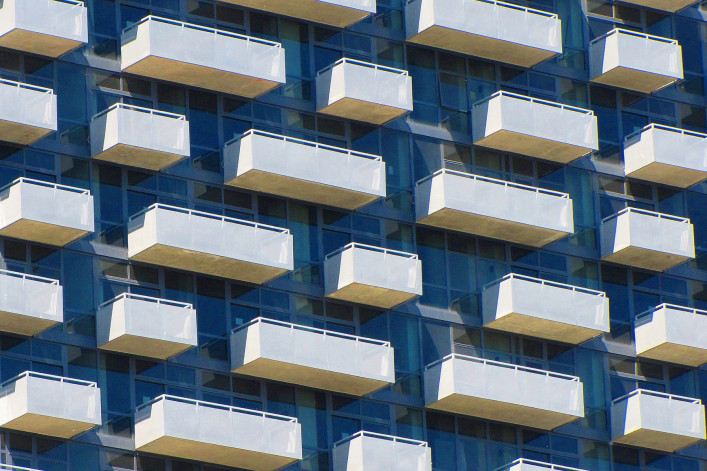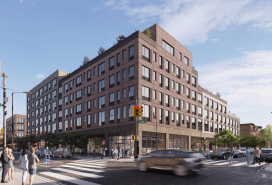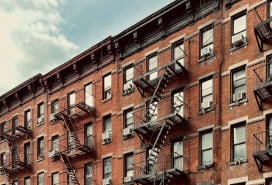Terrace test: make sure yours is safe

Summer is de facto balcony season, and we cheer for the respite that even the tiniest of outdoor spaces brings. Nonetheless, a couple of high-profile accidents over the past few years have got us thinking of worst case scenarios. In 2013, advertising exec Jennifer Rosoff fell from her 17th-floor balcony near the Upper East Side after its 1931 aluminum railing reportedly broke. In 2010, a man was killed after a fall from his 24th-floor balcony, which his landlord had been cited for failing to inspect two years prior.
The city has been paying closer attention, too: last May, the Department of Buildings updated its Facade Inspection Safety Program. Also known as "Local Law 11," the law now stipulates that owners of buildings over six stories must inspect outer facades, balconies, terraces and fire escapes, among other outdoor elements, with a certified architect or engineer every five years. The next deadline to submit inspection results is in February 2015, so no harm double checking with your landlord, property manager, or condo or co-op board that an inspection has been done or is in the works.
Luckily, residents can also be proactive about regular visual and physical checks, says Gary Mancini, senior principal at engineering firm Thornton Tomasetti. “It's the only common element on the facade that tenants have access to,” he says. “It's in their control.”
Here's what you need to know about recognizing potentially hazardous conditions, and who's on the hook for making sure nothing goes wrong:
How to spot a problem
Balconies are typically made of a combination of rebar and concrete, and cracks can allow water to come in and corrode the rebar. It's a good idea to check regularly for visible cracks or discoloration, says Mancini, as that could indicate a problem. Bonus: spring and early summer are good times to check, as balconies have just endured snow and stress from winter, and probably haven't been used much in a while.
Also, one or twice a year, a "balcony inspection needs to be done by an architect, engineer, or DOB inspector," says Robert Arthur King, an architect with The 3rd Floor Lab and professor at the New York School of Interior Design, noting that if you're in the process of putting one in, the contractor should at the very least be working off of an approved drawing made by an engineer or architect.
To double check the status of your balcony, you can put your building address into the city's Building Information System database and can look up information on both inspections and violations, notes Steve Wagner, a real estate attorney with Wagner Berkow.
Another source of danger? Shoddy railings.
According to DOB investigators, the railing outside Rosoff's condo was not up to code, and had been installed without welded rivets, which popped out when she leaned against it. For the welding, you'll want to have the work double checked by a professional, King says.
Railings, which are usually aluminum or steel, can deteriorate with water damage, too, so be sure to check for signs of rusting. You can also test the strength of railings by carefully shaking or pushing them, Mancini says, and if there's firm resistance, you should be all set.
Also, making sure balcony railings are properly secured against upward movement--that is, they include vertical bars that don't budge when you give the railing a shake.
One thing you don't need to worry about? Excess weight. Balconies are required to support 100 pounds per square foot--well over the 40 pounds per square foot required within the building, Mancini tells us.
Lastly, OlympianCares Home Inspections, a New York-based firm, has a handy checklist of things to keep an eye out for, including clogged drains or damaged brick.
Who pays for repairs
As you might've guessed, in almost all co-op buildings, the cost of balcony repairs is shared by all the residents, even if you don't have one attached to your apartment. (If you're not sure of your building's policy here, says Wagner, check the proprietary lease.) Repairs will generally be paid for by an assessment, the building's reserve funds, or payment via refinancing and/or drawing on a line of credit.
The process is similar in condos, where balconies are considered "limited common elements," says Wagner. The building is responsible for structural repairs, which would typically be paid for through an assessment or from the building reserves (again, the details of this will be hashed out in your building's by-laws).
In a building with 300 balconies, repairs can cost up to $10,000 to $20,000 per resident, estimates Mancini.
Typically, it's the fixes that aren't the owner's fault--the so-called “extraordinary” repairs, like repainting or replacing structural parts--that are covered by the board via assessments or reserves, Wagner says. Generally, both condos and co-ops hold unit owners with balconies responsible for “ordinary maintenance” like sweeping leaves and snow, says Wagner, as well as any damage specifically caused by the resident.
In rental buildings, the landlord is responsible for maintaining all common elements, including balconies. But tenants need to be careful as they can be liable for negligence if something falls off because the balcony isn't properly maintained, says Adam Leitman Bailey, a real estate attorney.
Keep furniture, plants, and so on as secured as possible (and far from the edges), and if you do notice a problem that needs repairing, steer clear of the area until you're sure your landlord has had it properly taken care of.
--Additional reporting by Roland Li
Related posts:
Childproofing your NYC apartment from top to bottom
The Great NYC Outdoors: FAQs for those lucky enough to have terraces, roofdecks and gardens
5 reasons to get apartment insurance if you have outdoor space (sponsored)


























